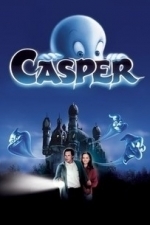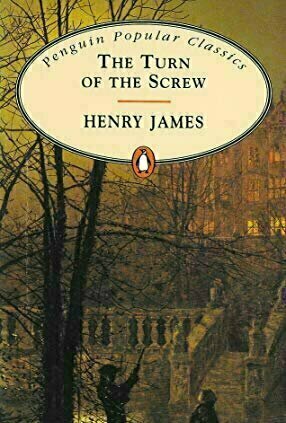Nicholas Ray: The Glorious Failure of an American Director
Book
"The cinema is Nicholas Ray". (Jean-Luc Godard). The visionary filmmaker Nicholas Ray spent his...

Marshal Vauban and the Defence of Louis XIV's France
Book
Marshal Vauban was one of the greatest military engineers of all time. His complex, highly...

Black Mirror - Season 3
TV Season
Black Mirror is a British science fictiontelevision anthology series created by Charlie...
Matthew Krueger (10051 KP) rated Casper (1995) in Movies
Oct 27, 2020
The plot: Casper (voiced by Malachi Pearson) is a kind young ghost who peacefully haunts a mansion in Maine. When specialist James Harvey (Bill Pullman) arrives to communicate with Casper and his fellow spirits, he brings along his teenage daughter, Kat (Christina Ricci). Casper quickly falls in love with Kat, but their budding relationship is complicated not only by his transparent state, but also by his troublemaking apparition uncles and their mischievous antics.
The film makes extensive use of computer-generated imagery to create the ghosts, and it is the first feature film to have a fully CGI character in the lead role. It goes for a much darker interpretation of the Friendly Ghost in comparison to the comics, cartoons, and films of the previous years, especially with its theme of death, most notably providing the character a tragic backstory that addresses his death.
In the mirror scene, Dr. Harvey was also supposed to transform into Spielberg. According to director Silberling, the cameo was filmed, but was cut for pacing reasons. Spielberg was relieved, feeling that he is not much of an actor himself and was quite nervous in front of the camera.
It was just strange to see all of those cameos, i felt like thier were just a wink to the audience of whom ever was watching. Like ohh their Dan Aykroyd and ohh their is Mel Gibson and ohh look Cilent Eastwood. The problem is this is films audience is for children, so children wouldnt even know who those people are.
Other than that its a great film.
Bong Mines Entertainment (15 KP) rated No Expectations - Single by Jillian Steele in Music
Jun 26, 2019
“Maybe I’m talking myself out of love. But I don’t believe that the stars just line up. When you know then you know but I don’t think I’ll ever know. When it’s right, is it right second guessing every time. Yeah, making sure I won’t ever let myself down.” – lyrics
‘No Expectations’ tells an interesting tale of a young woman who decides to let nature take its course instead of always trying to control things.
Apparently, she concludes that everything happens for a reason, and if she allows things to flow naturally, everything will work out the way it’s supposed to.
Later, she admits that it would be best if she became less controlling, stayed out of her own way, and let the pieces fall where they may.
‘No Expectations’ contains a relatable storyline, ear-welcoming vocals, and warm acoustic guitar-driven instrumentation flavored with a modern-pop fragrance.
The likable tune was co-written by Michel Heyaca and James Shelley (American Authors) during a period of uncertainty and confusion.
“Life was happening around me and I was just in it without any control and through this song I gained insight that I do deserve things and I should have expectations of what I want.” – Julia Steele
Jillian Steele’s musical influences include Maggie Rogers, Sasha Sloan, Julia Michaels, and other strong female musicians.
She uses her music to emphasize the importance of self-love and empowerment. A running theme throughout her music is reflection and she hopes her use of thought-provoking lyrics will help others gain insight in times of need.

A Rift in the Earth: Art, Memory, and the Fight for a Vietnam War Memorial
Book
A Distinguished and Bestselling Historian and Vietnam Vet Revisits the Culture War that Raged around...
History Art Architecture

Swimming in the Dark
Book
Set in early 1980s Poland against the violent decline of communism, a tender and passionate story of...
Historical Fiction Literary Fiction Communist Poland

Wild Bill: The True Story of the American Frontier's First Gunfighter
Book
The definitive true story of Wild Bill, the first lawman of the Wild West, by the #1 New York Times...
Merissa (11950 KP) rated Dearest Milton James in Books
Aug 27, 2021 (Updated Jul 17, 2023)
Oh man, what a story. I loved every word. Malachi is fabulous without being in-your-face flamboyant. Julian is a sweetheart with a wicked sense of humour. The only thing that confused me was right at the beginning. Even knowing that N.R. Walker is an Australian writer; when I read about London and Kings Cross, I automatically went to London, UK. So then I got confused about the price of a stamp, gift cards, etc. It didn't take me long to realise my error and to laugh at myself.
The story has the perfect cast of characters and a heartwarming mystery to solve. Honestly, I just can't point out the bits that I loved, as I would simply be telling you about the whole book. One thing I will say though is thank you for not crushing my hopeful little romantic heart. Instead, you brought tears to my eyes and a huge smile to my face.
This is an absolute corker of a book that I highly recommend. I adored every word.
** same worded review will appear elsewhere **
* A copy of this book was provided to me with no requirements for a review. I voluntarily read this book, and the comments here are my honest opinion. *
Merissa
Archaeolibrarian - I Dig Good Books!
Aug 27, 2021
Hadley (567 KP) rated The Turn of the Screw in Books
Mar 24, 2020 (Updated Mar 24, 2020)
With only 93 pages and the viewpoint of a governess, the story is one that has been up for debate as to its meaning for over a century, a story that blends child abuse and ghostly possession way ahead of its time. But even with its great plot, the story falls short and becomes bland throughout most of its short pages.
So why is the meaning of the Turn of the Screw still being debated? There's only one thing that has caused that --- it's in the way that James wrote the story, nothing is explained and everything is vague, these being very important parts that can keep this book from being enjoyable to many readers. Here's a summary of the story: a woman becomes governess of two children, one of which is sent home from school (technically expelled, in today's terms), the entire book has this woman trying to figure out why the child was sent home, but with ghosts thrown into the mix.
The story starts off with a man telling this ghost story from letters he received from a woman (the governess). But, even at the end of the book, the story never turns back to the man finishing the letters, yet this was done so masterfully that when you are done with the book, you completely forget about the man at the beginning, something that isn't easily done today in most writing. The man is reading these letters to a small audience that is also never revealed why, something that will seem completely irrelevant for the reader.
Readers finally get their paranormal fix when our main character, the governess, sees her first ghost in the Turn of the Screw. Our governess goes on an isolated walk when she spots an older man staring at her from a tower on the estate. But not until after a second encounter with this man, she decides to tell a housemaid about it, who quickly knows whom she speaks of. The maid is very certain that the man the governess has spotted twice is a deceased man that used to work for the family, but the maid is terrified by this because this man seems to have been abusive towards the son of the family and now seems to be continuing to torment him even after death.
Our governess seems to go down a path of paranoia as she seems to believe that the children are seeing the ghosts, too, but refusing to tell her so, and she becomes convinced that the key to getting them to confess is to finding out why the boy was sent home from school in the first place. She tries many times to get him to tell her why, but lets him take control of the conversations where he is able to divert the attention to something else. When things seem to be too much for the governess and housemaid to handle, they decide to try to write the childrens' uncle, and ask him to visit - - - this being the uncle that hired the governess and asked to never be bothered by her again, and that he wants nothing to do with his niece and nephew ever again, and especially don't write to him about any problems.
James is considered one of the greatest authors of the English language, but although this novella did very well, he wasn't known for ghost stories. His most popular book is 'the Portrait of a Lady,' which is about a young woman who comes into a large amount of money only to have it stolen by two con-men. Being that he is a Victorian-era writer, you can expect the overly long paragraphs and descriptions that the time was known for in 'the Turn of the Screw.' I personally felt the story had too many interludes of the governess' thoughts and ideas, which border on rambling. There seemed no point in the governess obsessing over why the boy was sent home from school when there are ghosts tormenting them at home- - - how this mode was suppose to work has left me clueless.
It's a usual horror trope to have children being possessed as the core of a book because it's something that can shake adults to their core at the thought that their own children could be that vulnerable. But James was way ahead of his time in the Turn of the Screw. He was able to put together psychological standpoints that weren't even discussed in his time, bouncing between child abuse with those children acting out to the power that abusers can still hold over their victims, even after death.
I'm giving the story a high rating, although I really didn't enjoy it. Why? Because it was a great idea and it was well written. If James hadn't been so vague on key parts, and hadn't left readers with a shocking unexplained ending, then maybe I would have liked it more. I can only recommend this book to people who like Victorian ghost stories, but for paranormal lovers, I think it falls short.




